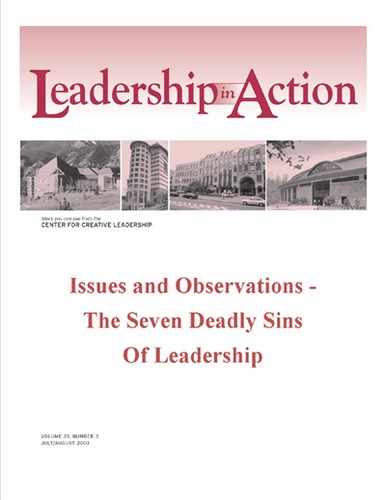The Seven Deadly Sins of Leadership
Cresencio Torres
Repent! Repent! Repent! It's a chant heard nowadays by many leaders of companies, government agencies, churches, and schools. But why should leaders need to repent, and for what?
In a 2003 article in In These Times, senior editor David Moberg suggests that we are experiencing a crisis in business and leadership. “Not every executive is a fraud or cheat,” he writes, “but if the system permits cooking the books, defrauding investors, overcompensating executives, rigging prices, polluting the environment, breaking unions and abusing workers, then it puts pressure on every business to move in those directions. . . . The excesses of managers have helped destroy many corporations, millions of good jobs and the retirement security of tens of millions.”
And in a 2002 article in Fortune magazine, Geoffrey Colvin, senior editor at large, observes that “the stock market may have gone bust these past couple of years, but now plenty of other things are booming: fraud, bankruptcy, shareholder lawsuits, recriminations, criminal charges, and, inevitably, personal debt crisis.”
What is the crisis in business and leadership to which Moberg and Colvin refer? It is the compelling desire of individuals to maximize their personal gain, power, and influence at the expense of others—and at whatever cost.
What we are seeing today is leadership malfeasance, and it may be only the tip of the iceberg.
Leadership wrongdoing isn't new; it has plagued humankind since the beginning of recorded history. It arises from personal misconduct and the evil caused by a malicious, malignant influence generated by an individual's desire for personal gain. When leaders are deficient in any aspect of personal character, the choices they make are based on misaligned morality, which results in havoc and chaos. These leaders are unable to pay attention to the core tenets that serve as a baseline for our fundamental values, attitudes, and beliefs—the essence of who we are as a people, our culture, and the moral fiber that binds each of us together.
The challenge that leaders must accept and meet to break the spiraling cycle of disillusionment with leaders in every aspect of our lives—business, government, religion, and education—is to identify this malfeasance and determine what can be done about it.
The tenets that serve as the basic organizing principles for malfeasance can be found in the concept of the seven deadly sins. Because we are (or at least should be) moral beings guided by a set of universal principles, we must be concerned at all times with the rightness and wrongness of our behavior and the choices we make. Effective leadership behavior manifests itself as a set of moral choices and acts, so leaders must consistently be concerned with right and wrong and the impact of their actions and behaviors on others.
At the end of the day, leaders must be judged by a code of conduct that cannot be superseded by inflated quarterly earning reports, initial public offering opportunities, stock options, and exaggerated bonuses.
The seven deadly sins, from a nonsecular perspective, are a set of transgressions against moral values.
Juxtaposed to them is a set of virtues that can shape character and guide behavior. There are similar sins and corresponding virtues found in all world religions, which suggests a universal understanding of and attitude toward moral obligation and responsibility. Because people throughout the world share a code of conduct and morality, the construct of the seven deadly sins provides a means of understanding our obligations and personal responsibility for the choices we make. If leaders lack awareness of themselves in just this one aspect of their personal character, it inevitably leads to disorder and devastation. Plato quoted Socrates as saying, “Know thyself,” and self-knowledge is the beginning of leadership development.
